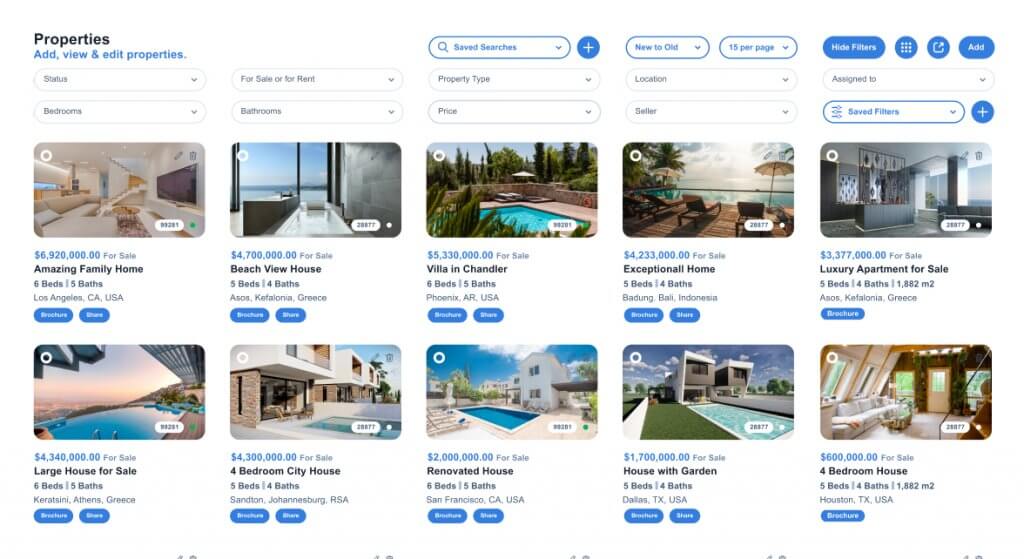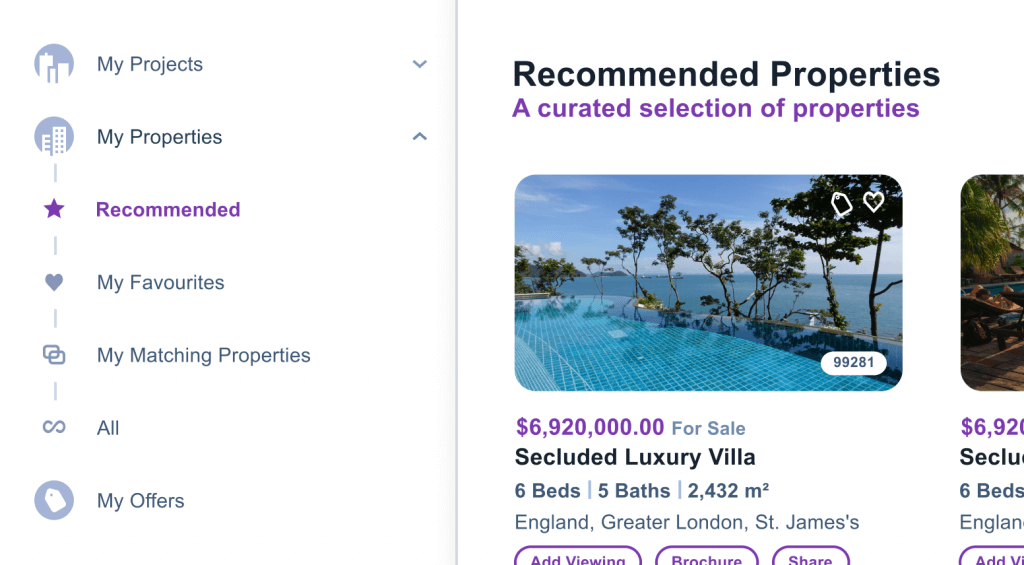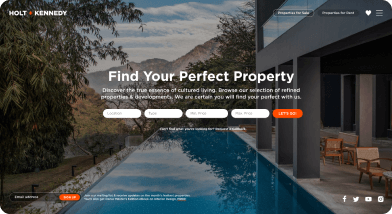In today’s digitally driven real estate industry, a visually appealing website is simply not enough. The reality is, home buyers and sellers have very specific expectations when visiting your website. To be effective and make the home-buying process quicker, you must include several key features to make your real estate website successful.
Your site must be thoughtfully designed, intuitive, user friendly, and frequently updated.
A strong online presence is an important part of any modern, professional real estate agency. A good website is guaranteed to reduce bounce rates and help achieve higher conversion rates.
Real estate websites attract thousands of views every month because they add value for both buyers and sellers. Buyers can preview hundreds of homes within a few hours and home sellers are able to showcase their homes to scores of potential buyers. With the limitations that come with the ongoing pandemic as well as the competitive nature of the real estate industry, a strong digital presence is crucial.
According to the 2022 National Association of Realtors Profile of Home Buyers and Sellers, 41% of recent buyers first looked online at properties for sale, while 19% of buyers first contacted a real estate agent. Buyers typically searched for 8 weeks, looked at a median of 8 homes and viewed 3 of these homes only online. Nearly all buyers used online tools in the search process at 95%. 94% of recent buyers were at least somewhat satisfied with their recent home buying process.
Start thinking about your website as more than just a digital business card.
The sooner you start thinking about your website as more than just a digital business card, the sooner you will see its direct impact on revenue, putting you in the same league as online giants like Rightmove, Zillow and Trulia.
As experts in real estate website design, we’ve mastered the common website features that drive engagement and conversions for some of the most tech-forward real estate agencies.
Incorporating these 6 essential elements into your real estate website will increase your visibility to prospects, and ultimately grow your business.
1. Responsive design
Your website will be viewed on multiple devices.
Mobiles have long surpassed desktops so if your real estate platform is hard to use on smartphones and tablets, you’ve already lost the game. Most users search for property on their phones, therefore, your agent website must incorporate responsive design elements that make your content accessible on any browser, platform, or device. Smartphones and tablets have smaller screens, use touch input, and are affected by varying mobile connection speeds. Additionally, Google favors mobile-optimized website design. In fact, it uses a search engine algorithm that rewards responsive websites with higher search rankings.
Good design boosts the user experience.
A refined user experience on any device is key to maximizing your online presence. When your website offers an enjoyable and intuitive user experience, potential clients are more likely to stick around and return. Good website design improves how people interact with your site in numerous ways. It lets them move through images quickly and seamlessly giving greater accessibility to your website. Always lead the user to the right sections in an intuitive and logical way. If you are not a web designer, hiring a web designer is money well spent. Our web design team will ensure that your real estate website works well on all platforms.
2. Lead capture capability
When it comes to real estate platforms, success is not measured by a few clicks and views. Your real estate website should be a tool that captures leads and turns them into clients. Don’t let your users leave your real estate platform without making a connection.
Prompt site visitors to provide their contact details using smart calls-to-action.
Make your calls-to-action subtle but effective by:
- Highlighting the benefits of subscribing to your updates and newsletters,
- designing strategic graphics and layouts that lead the viewer’s attention to a contact
form, - offering freebies such as e-books or market reports.
Make certain that your users have multiple opportunities to get in touch with you. Your contact information should be prominent on every page of your real estate website. To encourage conversations, always provide links to your social media accounts.
3. High quality visuals
Intuitive features will keep users engaged and good copy relays important information, but images have a magic power. Pictures capture the imagination of viewers and evoke emotion.
Visual media such as photos, videos, and virtual reality tours play a huge part in selling property.
Using high-quality photos coupled with detailed descriptions helps clients form a shortlist of properties they want to view. Relevant photos of the property play a big part in attracting potential buyers. Your buyer wants to visualize their ideal living space and photographs will capture a lifestyle more than words ever can. Ensure that your photos have good resolution and fit in with your responsive design. Be sure to show all rooms and amenities. Listing a property that does not show images of the individual rooms can discourage clients. Virtual reality videos of properties are a bonus and will give your clients a better idea of the overall feel of a property. Investing in professional photography can go a long way in creating a more authentic and personalized feel.
4. Intuitive navigation
Does your real estate website follow the 3-click rule? For website builders, three is the maximum number of clicks that a user needs to find any information that they need. Quick, easy, and convenient is key to keeping users happy.
Intuitive navigation equals good user experience.
Your real estate website design should be user-centric, which means it needs to have a well-planned navigation structure. Make it easy for visitors to find their way from the homepage to any other page with information they are looking for. Keep your website clean and uncluttered. Position navigation buttons where users can easily find them — leading visitors to other pages and call-to-action buttons.
5. Useful resources
The information you offer on your website should not be limited to property listings.
People want to deal with industry experts. Make sure your real estate website has informative sections that make you the top resource for all things property related. Remember that you are not just selling homes, you are also trying to build a relationships. An informative website that shares industry knowledge and provides a stellar user experience is crucial. Some examples of useful resources include:
- Mortgage calculator: Help buyers avoid committing to a property they cannot afford. A built-in calculator can manage a buyer’s expectations.
- Home valuation: Give prospective buyers a reliable estimate of their current property’s value so they can maximize their ROI.
- Regular market reports: Publish relevant reports on your website to keep savvy property owners and investors informed on market news.
- Lifestyle guides and blogs: Write an interesting blog with detailed neighborhood descriptions and lifestyle guides. Lists of notable attractions and events in the area help potential buyers get a glimpse of the local lifestyle they may soon be part of.
6. Integrated CRM
We all know that buying and selling homes is a complex process. Organizing contact information, handling relationship management and scheduling viewings are time consuming tasks that when done manually can lead to loss of sales.
CRM is designed to seamlessly manage your real estate business from a single platform.
CRM solutions stand for customer management software helping users manage, attract, retain clients, carry out transactions and close deals. Recent surveys show that 91% of agencies with 10 or more employees use CRM systems which means that even small businesses consider these solutions to be efficient and useful.
CRM tools aim to help companies shorten sales cycles. Online systems not only automate business flows and store client information, they offer real time communication and advanced conversion management. This helps companies with marketing and selling.
Qobrix is probably the most complete real estate CRM System in the market today. From the moment a lead is created, until well into the after-sales lifecycle, the Qobrix CRM System assists with every step in the process. Integrating with Qobrix lets you view hot leads and promote your listings on international real estate portals to reach homebuyers worldwide. Determining the most productive sources, generating specific property brochures, uploading client contracts, or analysing what types of properties are in demand, the Qobrix CRM System delivers effortlessly.
Is your real estate platform equipped with the right tools to boost your impact in a competitive industry?
Contact us and let our team of web designers help you build a mobile responsive CRM website that will drive lead generation and convert enquiries into customers.




